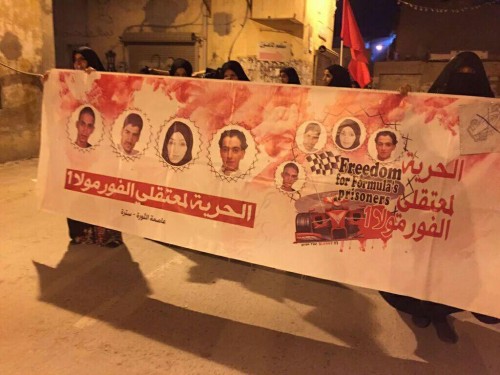On April 1, Americans said April Fools’ Day as they played pranks on each other and laughed it off. On the other side of the world in Bahrain, April 1 marked the fifth anniversary of Bahrain 13 member Sheikh Abdullah Isa al-Mahroos’s imprisonment. In 2011, members of Bahrain’s National Security Apparatus and government security forces arrested the prominent religious leader in his home. They subjected him to beatings in front of his family, blindfolded and handcuffed him, and took him to the Headquarters of National Security in Manama. Upon arrival, security officers reportedly tortured him. A military court sentenced him to 15-years in prison on numerous charges, in a trial criticized as politically motivated and unjust.
April 1 also marked the opening of the three-day Formula One Grand Prix in Bahrain, where some of the world’s best racecar drivers competed. Upon conclusion, members of Bahrain’s government patted themselves on the back for having successfully hosted the race, though human rights groups begged to disagree. Opposition news outlet Bahrain Mirror noted that protesters demonstrated against the race for the third consecutive day. Protestors called on the tournament’s organizer, the International Automobile Federation, to cancel the race. They argued that “the government has been exploiting the event to cover up its ongoing human rights violations over the past five years.” Further, the Bahrain Center for Human Rights noted that the Bahraini government used the Grand Prix to cover up human rights abuses and gain positive media attention.
Indeed Bahrain has played up the race in an attempt to burnish its image. Amnesty International noted however, “Away from the spotlight of the Formula 1 race, a range of appalling human rights violations continues to unfold in Bahrain.” Prior to the 2015 Grand Prix, Amnesty released five facts that one should know about Bahrain ahead of the race. Though published in 2015, these facts could apply to any of the years after 2011. The facts are familiar to any Bahraini opposition or political activist, and mirror the consequences many of them have faced, including Sheikh al-Mahroos, for their activism and opposition.
Many refer to the F-1 as the Race of Blood, after violent protests ahead of the 2011 Grand Prix caused the race to be cancelled that year. This year it landed on the fifth anniversary of a prominent activist’s unjust trial, and prison sentence. It also comes within weeks of the five-year anniversaries of the arrests of many other activists, like other Bahrain 13 members Hassan Mushaima, Abdel-Wahab Hussain, Sa’eed Mirza al-Nuri, Mohammed Ali Ridha Ismail, Abduljalil al-Miqdad, Mohammed Hassan Jawad, and Abdulhadi al-Khawaja. While members of the government may congratulate themselves on a job well-done hosting the F-1, for many other Bahrainis the day is nothing to celebrate.
Tyler Pry is an Advocacy Intern at ADHRB
Photo courtesy of Bahrain Mirror





